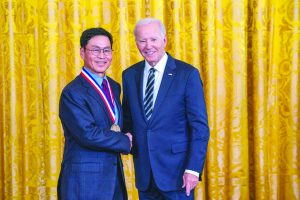
Last fall, Jeong Kim ’82, MS ’89, received the National Medal of Technology an Innovation, the country’s highest award for technological achievement.
The award recognized Kim’s contributions to data communications and broadband optical systems, including the invention of the asynchronous transfer mode (ATM) switch for wireless communications, a groundbreaking innovation that allowed the transfer of data, voice, and video over a single network infrastructure.
Just two decades after arriving as a 14-year-old immigrant from Korea with limited English, Kim sold his first company, Yurie Systems, for $1 billion in 1998. Today, he remains a leading innovator in telecommunications technology.
Kim credits education for much of his success. With the help of a Whiting School scholarship, he earned bachelor’s degrees in electrical engineering and computer science, followed by a master’s degree in technical management at Johns Hopkins. “Hopkins is academically strong, and they gave me the flexibility to take as many credits as I wanted so I could finish in three years,” he says.
He next served as a nuclear submarine officer in the U.S. Navy for seven years, obtaining his master’s degree while on shore duty at the Defense Nuclear Agency, and later earned a PhD in reliability engineering from the University of Maryland. It was after the Navy, while working as a contract engineer at the Naval Research Laboratory, that Kim developed the asynchronous transfer technology that enabled multimedia battlefield communications, the innovation that laid the groundwork for the ATM switch.
Today, Kim is co-founder and chairman of Kiswe Mobile, a live-streaming and interactive video platform for sporting events and concerts. Prior to that role, he served eight years as the 11th president of Bell Labs and was the first leader to ever be recruited from outside the organization. He was also jointly appointed as a professor in the mechanical engineering and the electrical and computer engineering departments at the University of Maryland and has served as a Johns Hopkins trustee and member of Whiting School’s Advisory Board.
“Being recognized by the President of the United States for accomplishments was not my intention,” says Kim, referring to the National Medal of Technology and Innovation. “But to have the things that I’ve done actually have made an impact on the lives of other people is very rewarding personally. I feel honored that I was able to make that impact.”




